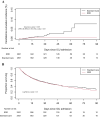Association between selective digestive decontamination and decreased rate of acquired candidemia in mechanically ventilated ICU patients: a multicenter nationwide study
- PMID: 38104095
- PMCID: PMC10724923
- DOI: 10.1186/s13054-023-04775-1
Association between selective digestive decontamination and decreased rate of acquired candidemia in mechanically ventilated ICU patients: a multicenter nationwide study
Abstract
Background: Candidemia is a high-risk complication among intensive care unit (ICU) patients. While selective digestive decontamination (SDD) has been shown to be effective in preventing ICU-acquired bacterial secondary infection, its effects on ICU-acquired candidemia (ICAC) remain poorly explored. Therefore, we sought to assess the effects of SDD on ICAC.
Method: Using the REA-REZO network, we included adult patients receiving mechanical ventilation for at least 48 h from January 2017 to January 2023. Non-parsimonious propensity score matching with a 1:1 ratio was performed to investigate the association between SDD and the rate of ICAC.
Results: A total of 94 437 patients receiving at least 48 h of mechanical ventilation were included throughout the study period. Of those, 3 001 were treated with SDD and 651 patients developed ICAC. The propensity score matching included 2 931 patients in the SDD group and in the standard care group. In the matched cohort analysis as well as in the overall population, the rate of ICAC was lower in patients receiving SDD (0.8% versus 0.3%; p = 0.012 and 0.7% versus 0.3%; p = 0.006, respectively). Patients with ICAC had higher mortality rate (48.4% versus 29.8%; p < 0.001). Finally, mortality rates as well as ICU length of stay in the matched populations did not differ according to SDD (31.0% versus 31.1%; p = 0.910 and 9 days [5-18] versus 9 days [5-17]; p = 0.513, respectively).
Conclusion: In this study with a low prevalence of ICAC, SDD was associated with a lower rate of ICAC that did not translate to higher survival.
Keywords: Candidemia; ICU; Selective digestive decontamination.
© 2023. The Author(s).
Conflict of interest statement
The authors report no conflict of interest related to this work.
Figures
References
Publication types
MeSH terms
Substances
LinkOut - more resources
Full Text Sources



